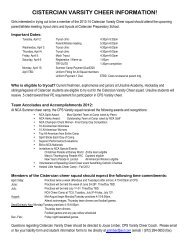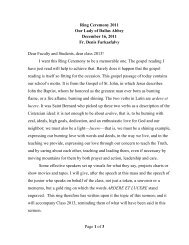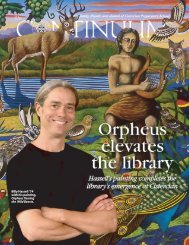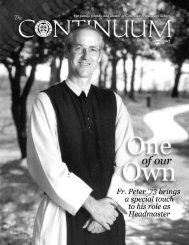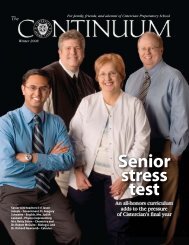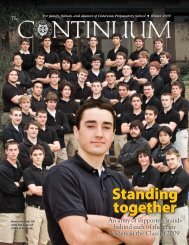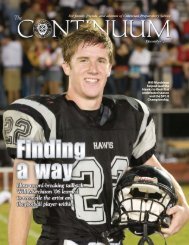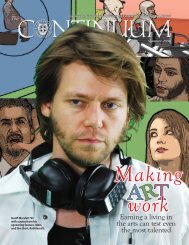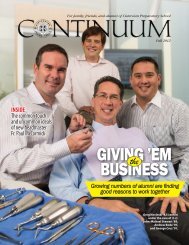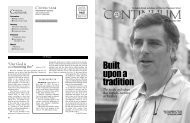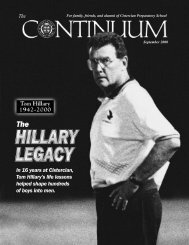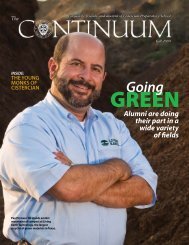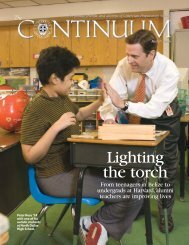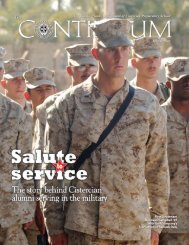Testing their Limits - Cistercian Preparatory School
Testing their Limits - Cistercian Preparatory School
Testing their Limits - Cistercian Preparatory School
Create successful ePaper yourself
Turn your PDF publications into a flip-book with our unique Google optimized e-Paper software.
explained. “First, I’m surrounded<br />
by a bunch of incredibly<br />
smart and passionate people<br />
who challenge me and teach me<br />
every day at work.”<br />
“Second, the work I do affects<br />
millions of people — if I do a<br />
good job, people worldwide will<br />
benefit, and if I screw up, I’m<br />
going to make those same millions<br />
of lives a little less productive<br />
and a little more annoying. I<br />
like that kind of scope,” he added.<br />
Screwing up at Microsoft also can mean incurring the<br />
wrath of one Mr. Bill Gates.<br />
“Yes, I am occasionally in meetings with him,” Kauffman<br />
admitted. “In fact, several times Bill has said to me, ‘That’s<br />
the stupidest thing I’ve ever heard!’”<br />
“Bill is whip smart, very intense, and very demanding in<br />
terms of what makes good software and good architecture.<br />
Preparing for a ‘Bill Review’ of your project is a key part of<br />
the engineering rhythm here,” Kauffman said. “It serves as a<br />
forcing function to make sure your plan is well thought out,<br />
you understand the business you’re in, and your execution is<br />
under control.”<br />
WORKING IN THE BELLY OF THE BEAST<br />
is all Kauffman has known, but for Robert<br />
“Tico” Lopez ’84, it’s a different story.<br />
“Guys like Kauffman, who came straight to<br />
Microsoft from college, don’t understand<br />
how good they have it,” said Lopez who has worked at<br />
Microsoft for five years.<br />
“Microsoft is the coolest place on Earth to work. The corporate<br />
culture is both competitive and partnering. The perks like<br />
free soda, my own office, and no dress code are nice. Coming<br />
from my previous Dilbert-like company, with a rigorous dress<br />
code and cubes (cubicles), it is especially cool.<br />
“But more importantly,” Lopez explained, “it’s the people.<br />
Working with the smartest people around is challenging, but<br />
it’s a fun challenge. And no matter what group I work with or<br />
what function this group may provide, I’m always dealing<br />
with extremely smart people.”<br />
Like Kauffman, Lopez enjoys the fact that designing software<br />
helps people. “It doesn’t hurt to know that the stuff<br />
I’ve worked on has directly helped millions of people<br />
around the world.”<br />
Most of Lopez’s early work centered around<br />
MSN (Microsoft Network).<br />
“My biggest early claim to fame was helping<br />
design and owning deployment of the first version of<br />
Expedia (the company’s online travel booking system).<br />
I also worked on MSNBC, Encarta, Slate, and a<br />
bunch of stuff which no longer exists.”<br />
“For the last 3 years, I’ve been the<br />
Operations Group Manager for both MSN<br />
MoneyCentral (the personal finance and investing<br />
portal) and the online components of<br />
Microsoft Money (the personal finance software).”<br />
Now, it’s on to new frontiers.<br />
“About a month ago, I moved into corporate<br />
training. I now own internal technical<br />
training for all Program Managers,<br />
“Bill [Gates] is whip smart, very<br />
intense, and very demanding in<br />
terms of what makes good software<br />
and good architecture. Preparing for<br />
a ‘Bill Review’ is a key part of the<br />
engineering rhythm here.”<br />
— Jon Kaufman ’86<br />
Developers, Testers, and Ops<br />
people in our product groups, as<br />
well as new training around our<br />
new ‘.NET’ initiative,” Lopez<br />
said. “This involves lots of project<br />
management, cross-group<br />
facilitation, curriculum design,<br />
presentations to groups as large<br />
as 500, integration of new distance-learning<br />
technologies, and<br />
not a small amount of people<br />
management acumen.”<br />
INTERVIEWS AT MICROSOFT ARE LEGENDARY.<br />
They intimidate most candidates through a combination<br />
of length, intensity, a complete lack of civility,<br />
and the occasional middle-of-the-night phone call<br />
with an enigmatic question or two. “The interview<br />
process is more rigorous than the stories,” said Lopez.<br />
“Microsoft is looking for the absolutely smartest people who<br />
can also think extremely fast, be very creative, and deal well<br />
with situations requiring extraordinary flexibility.”<br />
“You can know everything possible about the C programming<br />
language, but if you can’t demonstrate flexibility and<br />
creativity, you don’t get hired. And the scenarios being asked<br />
generally won’t involve programming. ‘Design a bathroom,’<br />
‘Design a new lock system for a car,’ and ‘Plan a BBQ’ are<br />
three typical starting points.<br />
“Coupled with complex technical questions and the fact that<br />
the interview process can span five to eight different back-to-back<br />
interviews covering one to two days, it can certainly be challenging<br />
for the interviewee. But,” he added, “it can also be fun.”<br />
Jeff Roberts ’86 agrees. “[Tough] interviews reflect our<br />
need for smart people. That’s all,” Roberts said. “Well, okay,<br />
they also reflect the fact that many of us are nerds who hate<br />
doing interviews.”<br />
“The interview questions tend to be either famous computer-science<br />
problems, or interesting little thought experiments.<br />
Either way, we want candidates to be able to write functioning<br />
code in whatever computer language they listed on <strong>their</strong><br />
resume, and we want them to show some interest and initiative<br />
tackling a problem they haven’t seen before.<br />
“Supposedly some universities keep records of all the interview<br />
questions we ask, so that <strong>their</strong> grads have a leg up. If so,<br />
not enough grads take advantage of those files,” he<br />
added with a chuckle.<br />
Roberts’ most visible project involved helping laptops<br />
communicate and share files.<br />
“Here’s an experiment: Take two laptops<br />
“The corporate culture<br />
is both competitive<br />
and partnering.<br />
The perks like free<br />
soda, my own office,<br />
and no dress code<br />
are nice.”<br />
— “Tico” Lopez ’84<br />
March 2001<br />
Photo by Catherine Juna<br />
7



